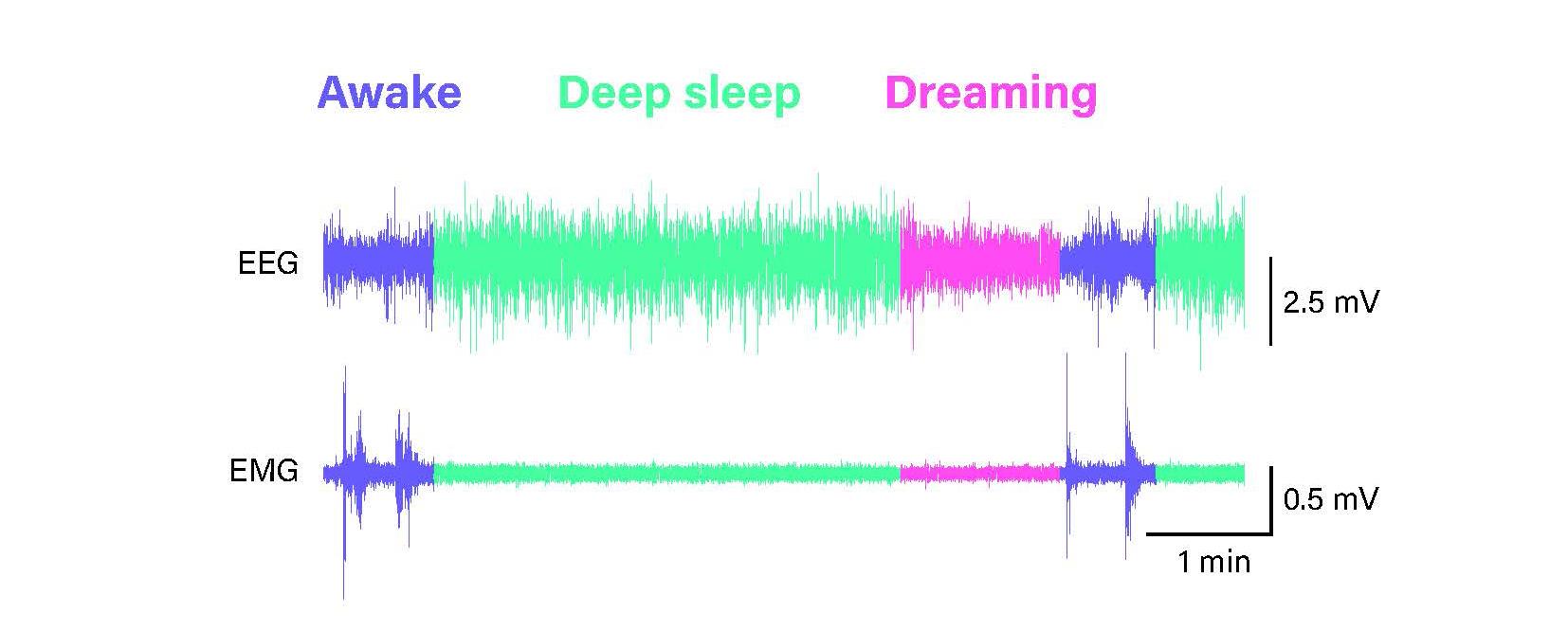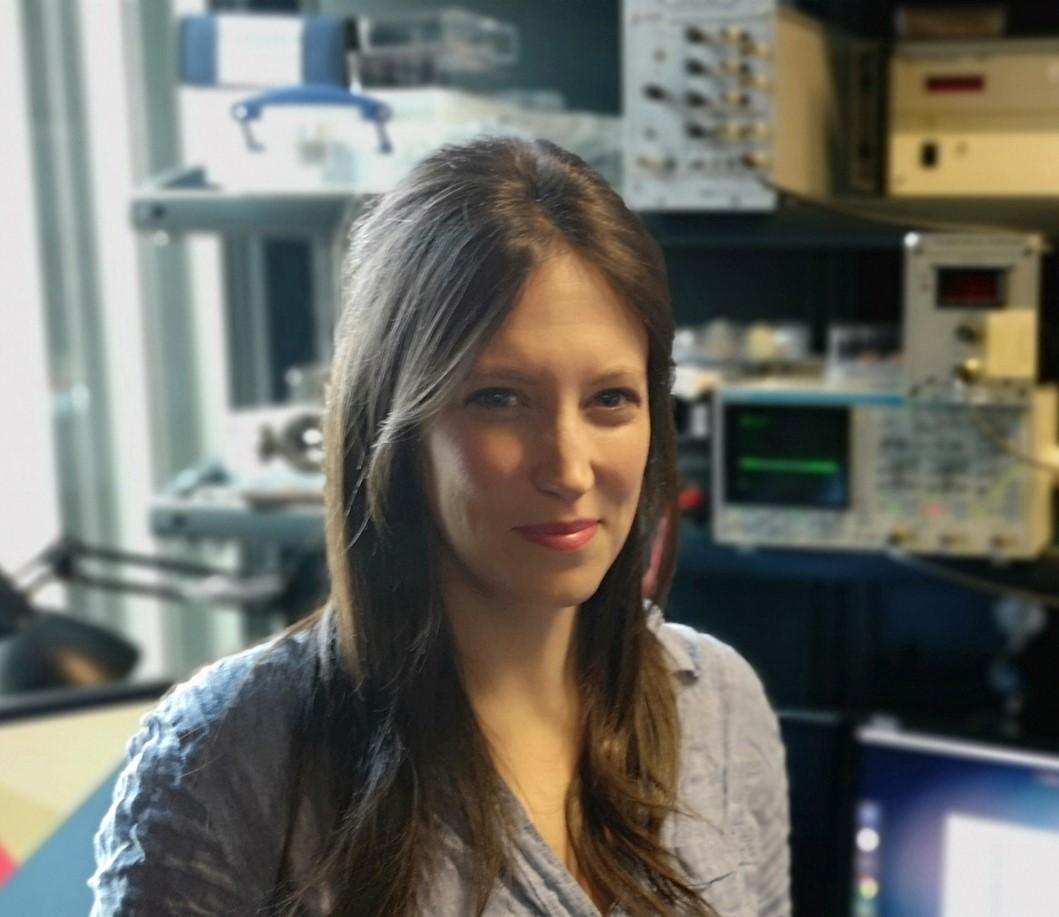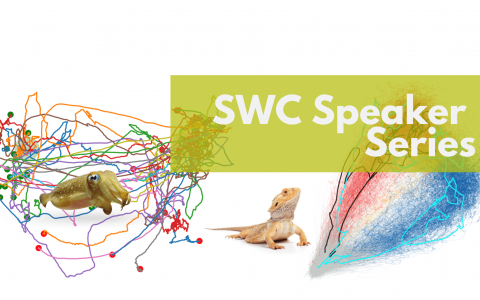
Investigating the role of sleep in future behaviour
An interview with Dr Julia Harris, The Francis Crick Institute, conducted by Hyewon Kim
What happens in our brain when we sleep? In a recent SWC Seminar, Dr Julia Harris discussed how inhibiting different populations of neurons in the brain during specific states of sleep led to effects that could shed light on the role of sleep in emotional processing. In this Q&A, she touches on what has already been known about the reasons why we sleep, her key findings, and what her lab will explore in future.
Historically, what have been some of the hypotheses given for why we, and other animals, sleep? Do all animals sleep?
Every animal that has been studied sleeps. The way that we define sleep (in animals where you can’t record their brain activity) is that it is a stereotypic posture that is homeostatically regulated and also has increased arousal thresholds. Homeostatically regulated means that if you deprive the animal of that state, it will do more of it at the next chance that it gets. Increased arousal thresholds means that it’s a state in which the same level of noise that would attract an animal’s attention while awake won’t disturb the animal while asleep. By this definition of sleep, every animal that has been studied does it.
Why do we sleep? I think most people would say we still don’t really know why and lots of theories have been suggested. One big theory is that it’s important for learning and memory consolidation, for which there is quite a lot of evidence. Learning and memory consolidation are also easy to access and measure in humans. A lot of sleep research has started in humans because you can easily ask a human to do this or that, allow them to sleep or not, maybe wake them up and ask them about their dreams and then the next day test them on the same task. So, for a long time, those kinds of studies have shown many different types of evidence of learning improving during sleep, even including low-level perceptual learning.
Creativity is also thought to be made richer with sleep. One idea is that during sleep you can integrate new information with all of the possible previous information. When you’re asleep, you don’t have to wait for a bus to appear to think of a bus. In a way, your sensation is turned off, and therefore all your memories are equally accessible. That way, you can start to make more abstract links between all of the different new things you’ve learned. That might be one reason why sometimes people have their best ideas during sleep. You wake up with a new creative insight. The shape of the benzene ring came to August Kekulé in a dream of a snake biting its own tail. And the discovery of acetylcholine – the idea that it is a chemical – also came to Otto Loewi in a dream. Creative writers have recounted the power of dreams in providing them with novel ideas.
So, there are lots from human work and even anecdotal evidence that sleep is doing something with learning, memory, and reconnecting or reorganising things in the brain such that new ideas can be formed or insight gained.
Only in the last couple decades have people started looking inside the brain while we sleep, at cellular level changes. One big finding there is that synapses tend to be downscaled overnight. A lot of the original research (from the Tononi and Cirelli labs) involved observing stronger synapses in a mouse after a period of wake, and weaker synapses after a period of sleep. From these initial observation of cellular level changes, the theory is that sleep has to do with energy restoration and the brain renormalising how much energy it uses. This also makes sense intuitively – I think it’s maybe a big clue that we wake up in the morning feeling energetically refreshed even though it’s the longest part of the day where we go without eating food. Nowhere else in the 24-hour period do you have 8 hours of no food, meals are more frequent! And yet, somehow, you wake up and compared to when you felt like you had low energy when you went to sleep, you have more energy. So it fits with our personal experience of sleep. And only now are we starting to look at what might be its physiological correlates. Work done in the last 5-10 years shows that metabolites and toxic by-products of cellular activity are cleared better during sleep – which is another more recent theory of why we sleep (from Maiken Nedergaard’s group).
Where I’m trying to go with my research is not to focus on one or the other of these theories, but to think about sleep as an altered state of consciousness – and in a way, to not treat it too differently from wake. Wake is not just for one function – we are doing lots of different things during wake, like sensing the environment or taking action. Sleep too probably doesn’t have just one function. Rather than focusing on one of these theories or the other, maybe we can think about sleep as a state as a whole, and how it is possible that it could be doing all of these things at once.
How much is known about what happens in the brain when we sleep?
A lot of what we originally know about what happens in the brain during sleep comes from human research and EEG recordings, where we clearly see definitive brain patterns that happen during sleep that don’t happen during wake. There are ways you can define sleep in different sleep states. This is very interesting because we don’t yet know what those activity patterns are for.

In the mouse, we can also detect some of these activity patterns and we can actually go in and look. In humans, you can do correlative studies like looking at how some of these waves affect what the human does the next day, but in mouse, you can do a bit more. You can interrupt certain sleep patterns, for instance, and see how this affects behaviour or neural connectivity.
The most famous finding is hippocampal replay, where place cells fire in a particular sequence as a mouse runs through a maze during wake, then during deep sleep often these exact same sequences are replayed (first shown by Wilson & McNaughton in 1994). They are replayed faster, or backwards. And if the mouse runs through two different mazes during wake, the replay can be a combination of the two, which goes toward the idea that sleep is not just replaying, it’s also integrating things together. Another theory is that sleep helps you rehearse different possible decisions – if a mouse has two mazes to choose from, it starts to put them together during sleep, almost deciding whether to go in one direction or the other.
As humans, we can talk about dreams afterwards, but in the mouse, it’s almost like you know what the mouse is dreaming about as it happens! Of course, these ripples don’t happen during REM sleep, which is the classical dreaming state. But when you wake humans up from deep sleep, they also report dreams – they are usually just much more boring. What REM sleep has, on the other hand, are very fantastical and vivid dreams.
Can you explain how your research tries to understand the role sleep plays in managing the energy efficiency of neuronal signalling?
If, during sleep, memories are strengthened, some synapses may be getting stronger. If energy efficiency is prioritised, then synapses should be getting weaker, because they are highly energetically expensive. If we can understand which synapses are getting stronger and which synapses are getting weaker, and how this contributes to neural processing, then we can understand how sleep is balancing energy and computation, perhaps selectively choosing to only invest extra energy in fragile new memories, while otherwise focusing on renormalising energy use.
What have been your key findings so far? How does the brain balance complex computation with energy availability?
There are a couple key findings from my work. It doesn’t seem to be the case in the brain that you can always assume computation is prioritised over energy efficiency or vice versa. The brain is therefore doing a complex optimisation that depends on what is most important for each brain feature. That is the kind of thinking I want to carry into sleep. Sleep could be mediating both these features. The brain has a hard limit on energy availability, but has to do complex computations. Sleep is a time in which you don’t have to deal with new incoming input from the outside world, so you perhaps could be regulating all sorts of connectivities in the whole brain, which is offline at once.
A different idea, proposed by Ken Harris and Vlad Vyazovskiy is that connectivity changes are not required to explain the cognitive benefits of sleep. What is important is that each individual neuron gets time to be offline so that it can spend energy fixing itself. While a neuron is firing, it needs to spend a lot of ATP on action potentials and synaptic transmission. And when you’re awake, constant sensory input means the whole brain is active collectively, and no single neuron can have time to redirect ATP to protein turnover or fixing its membranes. If you force yourself to stay awake, neurons may start having silent periods on their own because they need to repair themselves, and so tiredness leaves you cognitively impaired as individual neurons go offline. So you need to take yourself off to a safe place, like a nest or burrow away from potential predators, and let all your neurons repair themselves at once during a time when you’re not interacting with the world. And when you come back online, the neurons have had enough time to repair themselves, so are back in full force.
That’s kind of the opposite to the energy restoration theory I’ve talked about, which is that energy is being restored during sleep by synaptic downscaling, which would predict that when you come back online, fewer neurons would be active. But what Ken and Vlad’s theory predicts is that when you come back online, more neurons would be active because they have just had time to spend their energy elsewhere. I really like both theories, and wonder if they coexist. I think we will be able to see some of these predictions in the data.
How do your findings relate to the role of sleep in our own behaviours of exploration versus sticking to familiar routines?
What we observed is that when ventral tegmental area (VTA) activity is naturally low or artificially inhibited during deep sleep, mice are less like to explore and more likely to stick with familiarity during future waking. For the tasks we looked at, memory itself was not affected, which was initially surprising to us given the known links between sleep and memory. Rather, we saw that mice responded differently to remembered environments. This is highly speculative but, given that the VTA is involved in emotional processing during the day, maybe what it is doing during sleep is stripping away negative emotions associated with new memories. If we don’t get sleep, then our VTA won’t get a chance to cleanse the emotional traces of our memories. This theory fits with our experience, in that scary things often seem more approachable after a night of sleep whereas, if you don’t sleep, you are less likely to go out and explore, and more likely to seek familiarity.
As I mentioned, we were expecting to find an effect on memory, and that means the tasks were not explicitly designed to test the theory that I now have. I would like to design very clear experiments to test these theories, which are much more directed toward exploration, novelty versus familiarity, the emotions associated with these things, social behaviours, encountering a novel littermate versus familiar one, etc. That would also relate much more to our own experience of sleep.
Were you surprised to find that when VTA dopamine neurons versus vesicular GABA transporter (VGAT) neurons were optogenetically inhibited during different phases of sleep, future behaviour was affected in the same way?
When we inhibited dopamine and VGAT populations of neurons during wake, we saw opposite effects on awake licking (reward consummation) behaviour. When we inhibited them chronically during sleep, we also saw opposite effects: inhibiting the gamma-aminobutyric acid (GABA) neurons made the mice stay awake, and inhibiting the dopamine neurons made the mice engage in more deep sleep. All that was expected given other studies in the literature.
One thing that was strange to us was that we got the same effect on future behaviour, whether we inhibited dopamine or VGAT neurons, only during NREM sleep. We didn’t find any effect for REM sleep. Crucially, when we inhibited either population in this state-specific way, we didn’t see an overall effect on sleep architecture, but we did see an effect on future exploratory behaviour, that was the same for both the dopamine and VGAT population.
We don’t have a good reason why we think these two populations led to the same effect when they were disrupted during deep sleep. But some ideas we have are simply that we are messing up what the dopamine is doing, so the VTA output is not what it should be. Maybe it has to do with the theory of inverted U-shape for dopamine, which in the case of inhibiting dopamine neurons, we are decreasing dopamine output below its optimal neurons. In the case of inhibiting VGAT neurons, we are increasing dopamine above its optimal level. So, the ceiling and floor effects are the same. It’s an idea, but it fits with some dopamine theories in the literature.
What will the work in your lab focus on? Will you focus on both computational and energetic consequences of sleep?
What I want to do first, before revisiting more intuitive theories of sleep as I was just describing with the VTA, is get a basic and comprehensive description of how neurons’ wake activity translates to their sleep activity. What are the rules by which neurons decide to be reactive in sleep during slow waves, ripples, replay events, or spindles? And how does participation in those events change neural circuitry? Are the circuitry changes improving the energy efficiency of computation? Do some changes, like slow-wave-dictated changes prioritise energy efficiency while replay-mediated changes prioritise information? Are different connectivity changes dictated by different pressures? Do they all come together as a whole to mean that you wake up in the morning having neural circuitry that is better at computation and is more energy efficient?

About Dr Julia Harris
Julia Harris studied Physiology and Experimental Psychology at the University of Oxford. She then joined UCL’s 4 Year Wellcome PhD in Neuroscience, and completed her PhD on brain energetics in David Attwell’s lab. After her PhD, she was awarded an Imperial Junior Research Fellowship to work between the labs of Denis Burdakov (Crick) and Bill Wisden (Imperial), during which time she learned the skills required to study sleep in vivo (using EEG , fiber photometry and optogenetics to investigate how sleep activity in the VTA influences future behaviour). She is currently in Andreas Schaefer’s lab at the Crick, where she is continuing to work on sleep, now in conjunction with single unit recordings. She has also been working with the lab’s automated behaviour system (Autonomouse) and olfactory tasks.

